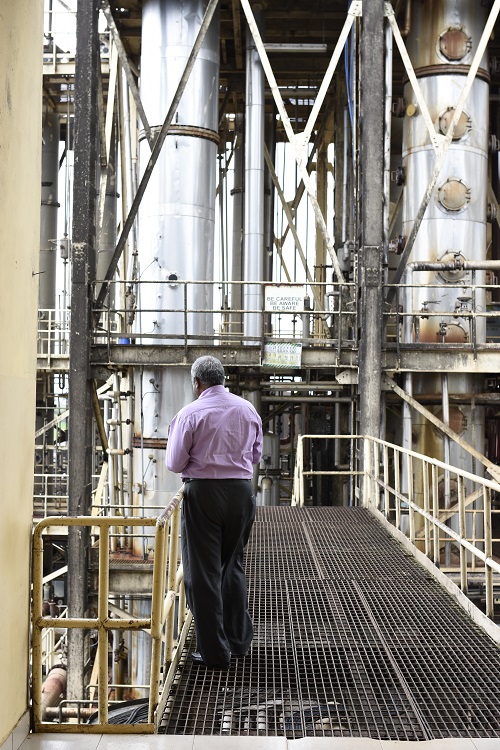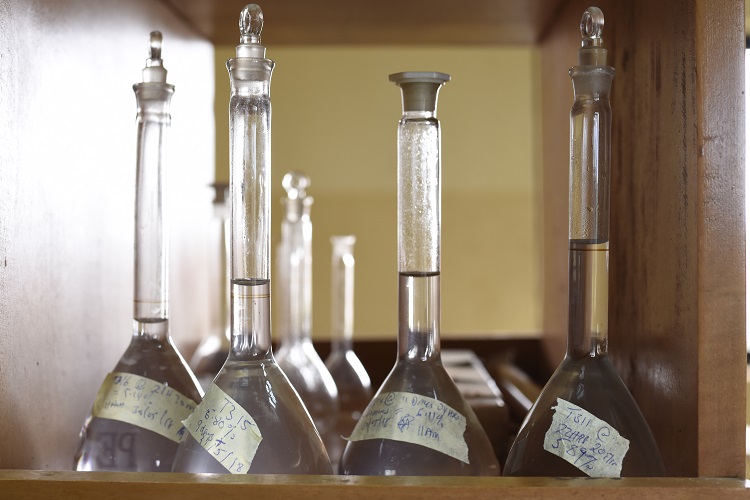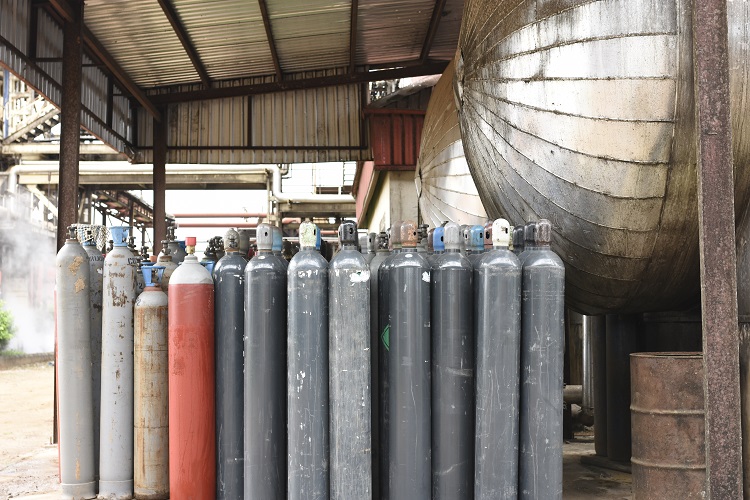
Most people are familiar with ethanol, in one form or another. The clear, colourless liquid alcohol is used in industries such as cosmetics, chemicals, pharmaceuticals, solvents and food and beverages. It’s made from a range of raw materials including sugar cane, sorghum, corn, sugar beet and wheat, among others. In Nigeria, it’s made from cassava. CAVA2 has been central to the task of bringing cassava farmers and large-scale business together, to create a thriving ethanol industry.
 “People ask, ‘Why cassava?’” Mr Rajavelu Rajasekar tells us. Mr Rajasekar is the Agriculture Director of Allied Atlantic Distilleries Limited (AADL), a large-scale industry based in Ogun State, south-western Nigeria, which uses fresh cassava roots to produce ethanol. AADL has been working with CAVA1 and CAVA2 since the enterprise began. “Nigeria is the largest producer of cassava in the world,” explains Mr Rajasekar, “so we thought that this was one of the sources to go for.”
“People ask, ‘Why cassava?’” Mr Rajavelu Rajasekar tells us. Mr Rajasekar is the Agriculture Director of Allied Atlantic Distilleries Limited (AADL), a large-scale industry based in Ogun State, south-western Nigeria, which uses fresh cassava roots to produce ethanol. AADL has been working with CAVA1 and CAVA2 since the enterprise began. “Nigeria is the largest producer of cassava in the world,” explains Mr Rajasekar, “so we thought that this was one of the sources to go for.”
Taking into account Nigeria’s place as the world’s biggest producer of cassava, with over 50 million metric tonnes every year, AADL had thought there was plenty of cassava for their enterprise. “We thought we could run the industry without any problems,” says Mr Rajasekar. “However, when we started running the plant, we could see that we could not operate at full capacity. The primary reason was we could not get the cassava we expected.” The reasons for this are many, and include cassava’s short shelf-life, difficulties in road transportation, and farmers’ yield, which was consistently low in Ogun and Oyo States.
 Around that time, Mr Rajasekar received some advice from Professor Lateef Sanni, of the Federal University of Agriculture, Abeokuta (FUNAAB), on improving cassava cultivation and working with farmers. Through continued links with Professor Sanni, who is the Country Manager of CAVA Nigeria, AADL also became involved in CAVA1, and then CAVA2.
Around that time, Mr Rajasekar received some advice from Professor Lateef Sanni, of the Federal University of Agriculture, Abeokuta (FUNAAB), on improving cassava cultivation and working with farmers. Through continued links with Professor Sanni, who is the Country Manager of CAVA Nigeria, AADL also became involved in CAVA1, and then CAVA2.
AADL are the first manufacturers of ethanol in Nigeria, now producing nine million litres a year. “We are also the biggest manufacturer of ethanol from fresh cassava roots in the whole of Africa,” adds Mr Rajasekar. The company currently makes 30,000 litres of ethanol daily, which requires 250 tonnes of fresh cassava roots every day. AADL need to ensure a steady, sustainable flow of cassava roots to their factory. One of the solutions to this challenge was to create an ‘out-grower’ programme, with the help of CAVA. Out-growers are contract farmers who enter into a formal agreement with an ‘off-taker’ – in this case, a company that buys the farmers’ raw material, the cassava roots, and offers some incentives to the farmers including training, fertiliser, improved cassava stem cuttings, use of tractors (free or at a reduced cost), and access to credit facilities.
 CAVA2 helped to build a network of farmers around AADL, by directly linking smallholder farmers and aggregators to the enterprise, and through their work with the Agricultural Development Programmes (ADP) of Ogun and Oyo States. CAVA2 experts trained farmers and ADP extension agents on various aspects of cassava production, including good agronomic practices. The extension agents were then able to train other farmers in the region, to disseminate the knowledge further. Since receiving this training, farmers’ yields have risen by 19 percent in Ogun State and by 29.5 percent in Oyo State, meaning that farmers’ incomes have increased along with their tonnes per hectare.
CAVA2 helped to build a network of farmers around AADL, by directly linking smallholder farmers and aggregators to the enterprise, and through their work with the Agricultural Development Programmes (ADP) of Ogun and Oyo States. CAVA2 experts trained farmers and ADP extension agents on various aspects of cassava production, including good agronomic practices. The extension agents were then able to train other farmers in the region, to disseminate the knowledge further. Since receiving this training, farmers’ yields have risen by 19 percent in Ogun State and by 29.5 percent in Oyo State, meaning that farmers’ incomes have increased along with their tonnes per hectare.
Further benefits of CAVA2 for the farmers include access to clean cuttings of cassava varieties that are resistant to diseases, a number of field days and town hall meetings, a demonstration farm showing good agronomic practices in use, further training from the ADPs, and knowledge of and access to other projects that the ADPs are working with. Benefits for the farmers translate into benefits for industry, as AADL are ensured a smooth supply of good-quality cassava roots with good starch content.
CAVA2 was instrumental in establishing a sustainable network of 4–5000 farmers mobilising cassava roots to a reliable buyer, which improves the farmers’ income, whilst the cassava they provide ensures that the factory can continue distilling quality ethanol that is made into products including spirits and wines. Additionally, a by-product of the cassava fermentation process is carbon dioxide, used in carbonated drinks, which AADL sell to any of the large companies including Pepsi and Coca-Cola. In essence, cassava is used to make both the spirit and the mixer for the perfect cocktail, whilst CAVA2 ensures that both large-scale industry and smallholder farmers are getting the right blend of benefits.
The CAVA2 project ran from 2014–2019 with the aim of improving the lives of smallholder farmers across five countries in Africa: Nigeria, Ghana, Uganda, Tanzania and Malawi. Supported by the Bill & Melinda Gates Foundation, CAVA2 was led by Nigeria’s Federal University of Agriculture, Abeokuta (FUNAAB) and NRI. The project’s focus was to develop the value chains of cassava, the tropical root crop that’s a staple food for millions of people across Africa. Once harvested, the crop needs to be processed quickly, for fresh cassava roots begin to deteriorate 72 hours after harvest. Other challenges include increasing yield, managing pests and diseases, and transporting the bulky roots by road.

